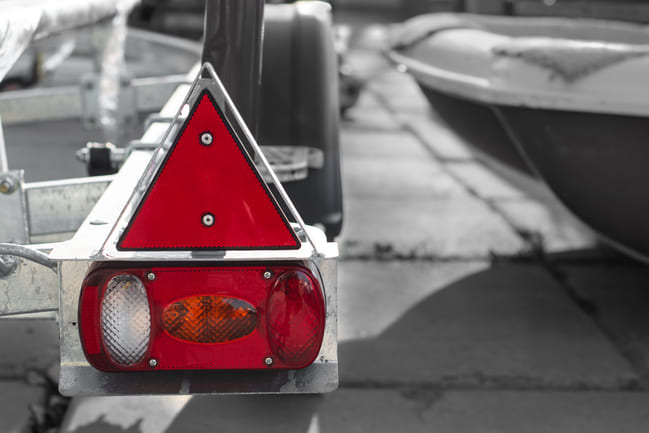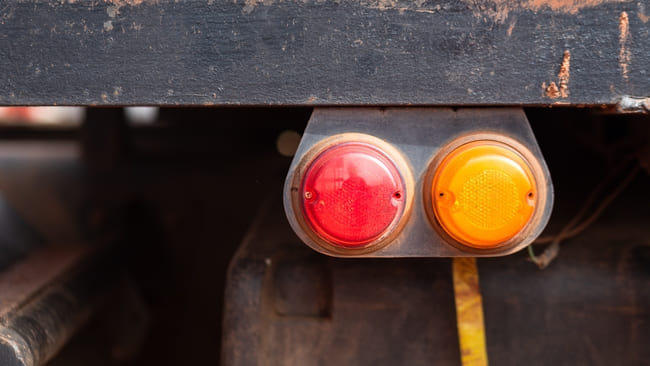
Regardless of whether you are traveling privately with a car or professionally with a truck – there are always situations in which it is necessary to carry a trailer with you. Be it to help an acquaintance move and to lug heavy furniture from A to B, or to transport valuable cargo for the company to the end customer. In various moments, we need to lead a follower. But in addition to the necessary driver's license, which you must have in order to legally be able to drive a trailer, it must also be roadworthy. Because just like a vehicle has to pass the TÜV, this is also the case for car and truck trailers. Here, too, certain units must be intact so that maximum safety on the road can be guaranteed. In addition to various other factors that must be taken into account, intact and correct lighting is particularly important here. In the following, we want to explain in more detail how the lighting should be installed, what is not permitted and which lights are actually available.
Contents
- 1 What kind of proper lighting is there on the trailer and what is mandatory?
- 2 How can a flawless wiring of the rear lights are guaranteed?
- 3 What fine do I have to expect for which traffic offence?
- 4 But what exactly does it actually say the road traffic regulations?
- 5 Can I do without brake lights on the trailer?
- 6 The conclusion and a tip from CarTipsandmore
What kind of proper lighting is there on the trailer and what is mandatory?

First of all, taillights are mandatory, they should be in the form of triangles. A brake light is also of absolute importance here, so that it can be recognized when the vehicle is slowing down or even braking heavily. If the trailer can be driven at more than 60 km/h, a rear fog light is also essential. In addition, side lights are to be attached, this has the simple reason that the dimensions of the trailer should be recognized directly. This is of absolute importance, especially in poor light conditions or when driving at night, so that the extent to which the vehicle's dimensions take up the road can be recognized directly. Accidents can be avoided in this way. The side lighting is also there so that other participants in traffic can assess exactly to what extent the vehicle and its load are occupying the road. Finally, the parking lights should not be missing, because visibility and direct recognizability is also important here when the vehicle and trailer are parked on the side of the road in the dark.
How can a flawless wiring of the rear lights are guaranteed?
Of course, the rear lights can only work perfectly if a power supply is guaranteed. This is ensured by a proper connection with the trailer hitch. There is a socket on the trailer hitch itself, which can be used to transmit electricity with a voltage of mostly 12 volts.
What fine do I have to expect for which traffic offence?
Depending on the mistake you made when lighting the trailer, there are different fines. For example, if you are stopped by the police and your trailer does not have its own lighting, you can expect a fine of 20 euros. If an accident is caused in the process, it can quickly cost twice as much. If the lighting units here are noticeably dirty, so that visibility is impaired, you can also expect a 20 euro fine. If the lights are not even ready for operation, around 20 euros will also be charged here. If an accident was caused in this way or even through fault, the amount of the fine doubled here as well. All in all, it is worthwhile always making sure that the taillights and other lights are in the best condition and properly attached and wired.
But what exactly does it actually say the road traffic regulations?
According to the StVZO, what is stated in paragraph 49a basically applies: “Only the prescribed and approved lighting equipment may be attached to motor vehicles and their trailers. Luminescent materials and reflective materials are also considered to be lighting equipment. The lighting equipment must be properly and securely attached and always ready for operation.” It is also important to note that differences must be recognized between the headlights, the rear reflectors and the indicators. It should be immediately apparent that a vehicle with a trailer driving in front wants to turn left or right or is simply slowing down. Maximum road safety can only be guaranteed if the intentions of other road users are directly apparent.
Can I do without brake lights on the trailer?

Definitely no. The brake lights are among the most important lighting units in road traffic. This applies not only to cars or trucks, but also to trailers, since these usually cover the brake lights of the motor vehicle. The other road users on the road must be informed at all times about a possible braking process, because paragraph 53 paragraph 2 of the StVZO expressly states: “Motor vehicles and trailers must be equipped with two sufficiently effective brake lights for red light at the rear, which activate the service brake backwards , in vehicles according to paragraph 41 paragraph 7 of the mechanical brake. The brake lights may also illuminate when a retarder or similar device is activated. Brake lights placed close to or in combination with the rear lights must shine more brightly than these…” This makes it very clear that the brake lights must be more conspicuously illuminated than the other lights. This is the only way to avoid confusing the other participants on the road.
The conclusion and a tip from CarTipsandmore
To sum up say that lighting is the absolute be-all and end-all when towing a trailer. If care is not taken to ensure that the lights work properly and are attached to the correct places, and that there is an intact power supply via the trailer hitch, a fine can quickly be incurred.
The police make no exceptions here and pay close attention to correct lighting in traffic. Because not only motor vehicles, but also their trailers have to undergo and pass a TÜV inspection.
This is the only way to avoid accidents. CarTipsandmore also recommends considering at this point that different plug systems are combined for power supply via the towbar. This ensures particular reliability. The license plate light on the trailer should also work. If you are unsure whether everything on your trailer is compliant and working properly, you can go to the nearest workshop and ask the experts there for advice. Within a few minutes you can be told whether your car and trailer are roadworthy or not. If defects are found, they must be remedied as quickly as possible. Because road safety must always be the top priority.
